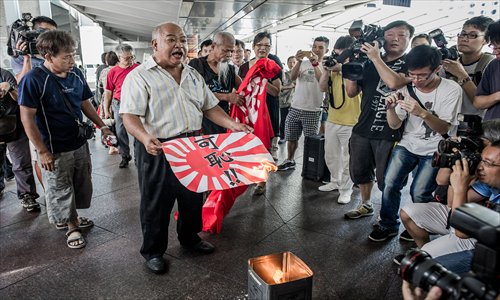Dispute hits Japanese firms

Japan's business sector appears to have taken the heat against the backdrop of the country's cooling relations with China due to an escalating row surrounding the Diaoyu Islands in the East China Sea.
Analysts cautioned that the ongoing tensions would further dampen trade between the region's two biggest economies.
Japanese electronic giants recorded a sharp decline in their sales volume in the Chinese market in August, according to the China News Service. The report quoted data from an unnamed home appliance retailer, showing that Toshiba, Sanyo, Panasonic and Sharp saw their sales of TV sets drop between 21 percent and 44.3 percent in Beijing, Shanghai and Guangzhou.
Ma Chunping, a staff member with FAW Toyota Motor Sales Co, confirmed Wednesday to the Global Times that the recent disputes over the Diaoyu Islands have affected the sales of Toyota, but stopped short of revealing specific figures.
"We went ahead with promotions in the Chinese market, but saw fewer consumers in the last month," said Ma.
A salesperson surnamed Zhang with a Honda retailer in Beijing told the Global Times that his store has seen a slight drop in sales of Honda models.
Some Web users launched a campaign calling on the public to boycott Japanese goods.
Lu Jianren, a researcher with the Institute of Asia-Pacific Studies under the Chinese Academy of Social Sciences, told the Global Times that Japan's unilateral move to "purchase" the islets had hurt the sentiments of the public in its largest export market.
According to Lu, Chinese consumers could find replacements for Japanese goods such as home appliances, cars and machinery, which would definitely drive down imports from Japan.
A press release sent to the Global Times by Shanghai Metals Market, a metals information provider, expected the islets row to intensify price fluctuations in the copper industry. Japan is China's largest source of copper belts.
Analysts noted that the "cold politics and warm economic ties" between Tokyo and Beijing no longer applies to the current situation of bilateral relations.
However, Lu said that economic countermeasures would be a double-edged sword, which may reverse the trend of growing FDI from Japan and lead to a shutdown of Japanese-funded plants in areas like Dalian.
"We should be cautious in resorting to economic means, and take those that could minimize our own losses."
The cooling ties have also led to cancellations of exchanges at various levels between the two sides.
Japan's Kyodo News reported that China Eastern Airlines Wednesday cancelled a meeting with Fukushima governor Yuhei Sato, who is seeking a resumption of flight services between Shanghai and Fukushima. On the previous day, China's civil aviation authority also cancelled a meeting with Sato.
Amid a series of countermeasures against Tokyo, China Tuesday sent two maritime surveillance ships to the waters of the Diaoyu Islands.
However, Phoenix TV Wednesday quoted Japanese Coast Guard (JCG) as saying that it had found the two vessels in waters far away from the Diaoyu Islands. The JCG said the vessels didn't enter the so-called Japanese territorial waters and neighboring waters, and they had sailed opposite the islets.
The report triggered disappointment by Web users, who demanded the government take stronger measures to assert the country's sovereignty.
An anonymous official with the China Marine Surveillance Wednesday told the Global Times that he was not authorized to reveal the patrol routes or the location of the two ships.
Jin Yongming, a researcher on law of the sea with the Shanghai Academy of Social Sciences, Wednesday told the Global Times that if the vessels don't enter waters within 12 nautical miles of the islets, the patrol would be "more of a gesture than concrete action."
"To fully declare China's sovereignty, the vessels should play their due role by patrolling in the area and expel and administer foreign ships," noted Jin.
Japan's move to put the islands under state control came ahead of a major leadership transition in China, which is expected to take place at the 18th National Congress of the Communist Party of China next month, triggering speculation that Beijing may be lowering its tone to maintain domestic stability.
Sun Cheng, from the China University of Political Science and Law, told Reuters that "Chinese people won't disregard territorial disputes just because of the economy and the Party Congress."
Xu Tianran and agencies contributed to this story